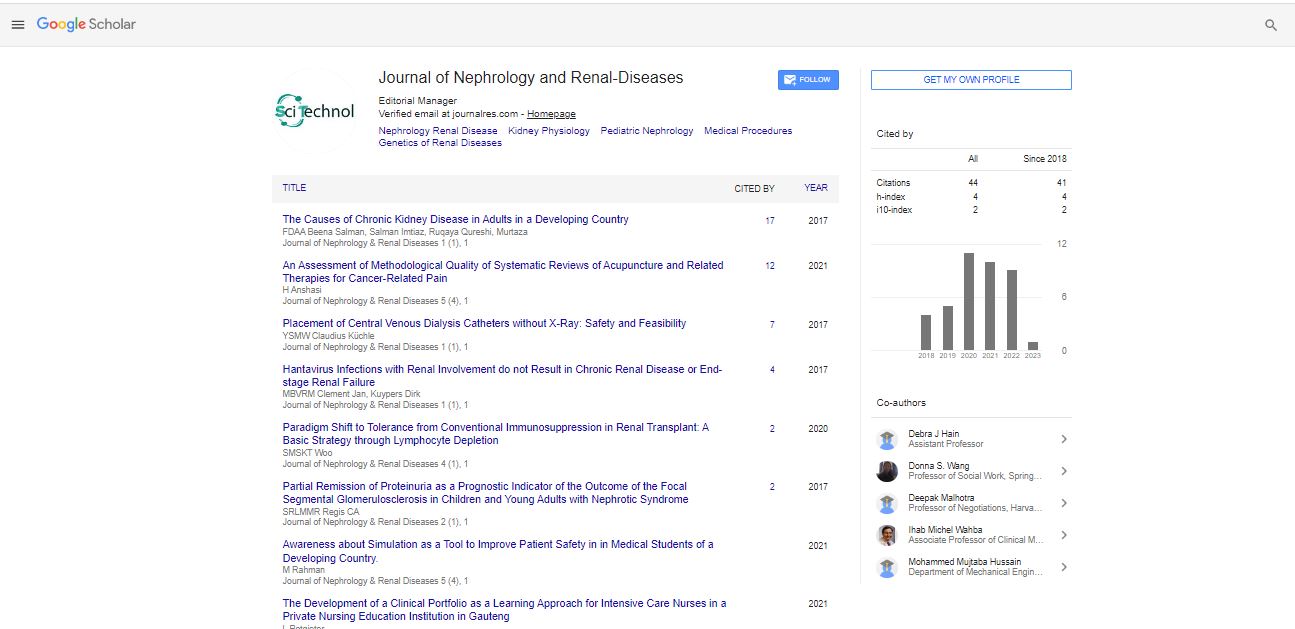Acute Kidney Injury (AKI) is prevalent among hospitalized Coronavirus 19 (COVID-19) patients, which may lead to adverse outcomes, worsening co-morbidities, and increased healthcare cost
Gideon Libiran
The Capital Towers, Philippines
: J Nephrol Ren Dis
Abstract
Introduction Acute Kidney Injury (AKI) is prevalent among hospitalized Coronavirus 19 (COVID-19) patients, which may lead to adverse outcomes, worsening co-morbidities, and increased healthcare cost. COVID-19 patients may experience a more severe AKI, greater dialysis requirements and less inpatient recovery. OBJECTIVES The study compared the longitudinal kidney function of COVID positive and negative patients with AKI with the following parameters: (a) rate of change in eGFR post discharge, (b) demographics and clinical characteristics, and (c) subgroup of patients who did not achieve AKI recovery. METHODS Retrospective cohort study was employed using electronic medical records at a private tertiary hospital in Taguig City from March 15 to September 15, 2020. Admitted patients with AKI and underwent RT-PCR testing were screened and grouped based on RT-PCR result. Other criteria used for inclusion were the following: with at least 2 inpatient creatinine, who survived, who were discharged stable, and had at least 1 outpatient creatinine during the next 6 months post discharge. Descriptive and inferential (univariate and multivariate) statistics were used. Normality and other assumptions assessment tests were used for statistical treatment. All hypothesis tests used 5% level of significance. RESULTS Comparing the 2 groups, the median eGFR was higher for the COVID negative group at different time points. Negative rate of change in eGFR was seen on baseline up to peak in-hospital creatinine. However, positive rate of change in eGFR was seen from peak in-hospital up to discharge. From discharge up to outpatient creatinine, declining rates seen on COVID positive group while slight upticks on COVID negative group. The COVID positive group were mostly males, non-smokers, hypertensives, diabetics, without other cardiovascular disease or congestive heart failure, high BMI, without malignancy, and not using immunosuppressants. Oxygen support was commonly used and AKI Stage I was the most common AKI stage. 12% of the total subjects did not achieve AKI recovery. Malignancy was also negatively associated with AKI, being twice more likely not to achieve recovery. Nephrotoxin use and the severity of AKI stage also contributed to AKI non-recovery. CONCLUSION Higher mean eGFR were seen across all time points for the COVID negative group. The mean eGFR slope post discharge showed faster decline for the COVID positive group. The COVID positive group were predominantly males, non-smokers, hypertensives, diabetics and without other cardiovascular disease or congestive heart failure, high BMI, no malignancy or immunosuppressants. There were no significant differences in terms of AKI recovery between the 2 groups seen in this study.
 Spanish
Spanish  Chinese
Chinese  Russian
Russian  German
German  French
French  Japanese
Japanese  Portuguese
Portuguese  Hindi
Hindi 
